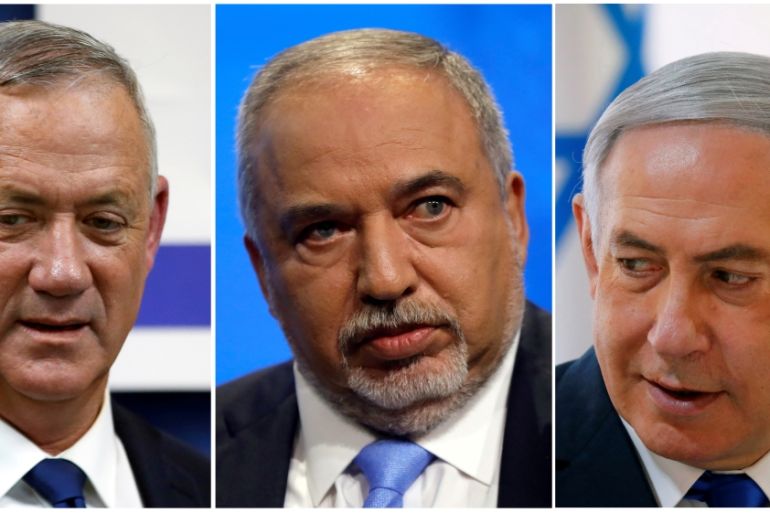Third Israel election looms after failure to form government
Kingmaker Avigdor Lieberman of far-right Yisrael Beiteinu party refused to back Israeli PM Netanyahu or Benny Gantz.

Israel moved closer towards holding a third election in less than a year on Wednesday after Prime Minister Benjamin Netanyahu’s main challenger failed to form a government.
Benny Gantz’s announcement that he would not meet a midnight deadline following Netanyahu’s own failure to put together a coalition in October deepened political deadlock at a time of mounting security and economic concerns.
Keep reading
list of 4 itemsCroatians vote in election pitting the PM against the country’s president
Solomon Islanders vote in election that could shape ties with China
Analysis: Ruling party errors give Turkey’s opposition hope for future
“In the past 28 days, I have left no stone unturned, irrespective of how small, in my attempt to form a government that would bring to the state of Israel leadership with integrity, morality and values,” Gantz said.
“We have made great efforts toward forming a broad, liberal unity government … a government that will serve everyone – religious and secular, Jews and Arabs.”
Neither Netanyahu, who heads the right-wing Likud party, nor former general Gantz of the centrist Blue and White secured a ruling majority in parliament in elections in April and September.
Netanyahu, in office for the past decade, failed to put together a coalition after the inconclusive September election. Gantz was handed the task by President Reuven Rivlin next, but his 28 days to form a government expire at midnight (22:00 GMT).
There was no sign of progress towards a Rivlin-proposed deal for a national unity government that would include Likud and Blue and White after weeks of talks.
Lieberman, who heads the far-right Yisrael Beiteinu party, told a news conference on Wednesday that “both [Netanyahu and Gantz] were guilty” of failing to agree on a Likud-Blue and White alliance, which he had strongly advocated.
With no unity government in sight, Lieberman said, he would deny both men the support of his party’s eight legislators, effectively meaning neither Netanyahu nor Gantz would have sufficient backing to form more narrow administrations.
“As things stand now, we are on the way to another election,” Lieberman said.
Ultraorthodox
Lieberman reiterated his opposition to a Likud-led government that included ultraorthodox Jewish parties whose religious influence over life in Israel he opposes, such as the community’s exemption from military service.
The former defence minister is known for his tough rhetoric on Gaza, and has also stated his opposition to a Gantz-led administration that would be dependent on support from Arab parties he described as a “fifth column”.
Such rhetoric, also echoed by Netanyahu, has drawn rebukes from Rivlin who warned against demonising Israel’s 20 percent Palestinian-Arab minority.
Instead, Lieberman called for a unity deal between his party, Netanyahu’s Likud and Gantz’s Blue and White coalition.
Both said they supported the idea, including rotating the premiership, but they disagreed who should go first.
Blue and White demanded Gantz get the first go since his party won the most seats, finishing with 33 compared with Likud’s 32.
Netanyahu, however, argued that his experience in the post made him the logical choice.
Talks continued late into Tuesday but collapsed with mutual accusations of blame.
“Unfortunately, during our meeting last night, Benny Gantz refused to accept the conditions put by Avigdor Lieberman, that is to accept the president’s solution that, as prime minister, I will be the first in rotation,” Netanyahu said on Wednesday.
Gantz hit back, accusing Netanyahu of “rejecting unity” and doing everything he could to “drag us into elections for a third time”.
|
|
‘Miracle’
All sides said they remained committed to avoiding a third election, which would be deeply unpopular with the Israeli public.
However, Gantz has baulked at ultraorthodox participation in a unity government, saying he wanted to establish a “liberal” administration more in tune with Israel’s secular Jewish majority.
And Netanyahu insisted on preserving what he described as a right-wing bloc – whose support he would need should he seek parliamentary immunity from prosecution if he is indicted on corruption charges.
Israel’s attorney general is widely expected to announce within days whether he will accept police recommendations to charge Netanyahu.
Netanyahu faces no legal requirement to leave the government if indicted. He could face fraud and breach of trust charges in all three probes, and bribery charges in one.
Should Wednesday’s deadline expire without a coalition deal, a 21-day period will begin in which legislators can nominate any legislator, subject to the agreement of at least 61 of parliament’s 120 members and a formal mandate from Rivlin, to try to establish a coalition.
Failure to do so automatically triggers an election in 90 days.
Israeli columnist Ben Caspit, writing in the Maariv daily newspaper on Wednesday, said it was now all but inevitable.
“The path towards establishing a government in Israel has never been at a greater impasse,” he wrote.
“We are going to need a miracle to avert a third election – either that or a bold, surprising and courageous decision by one of the players.”